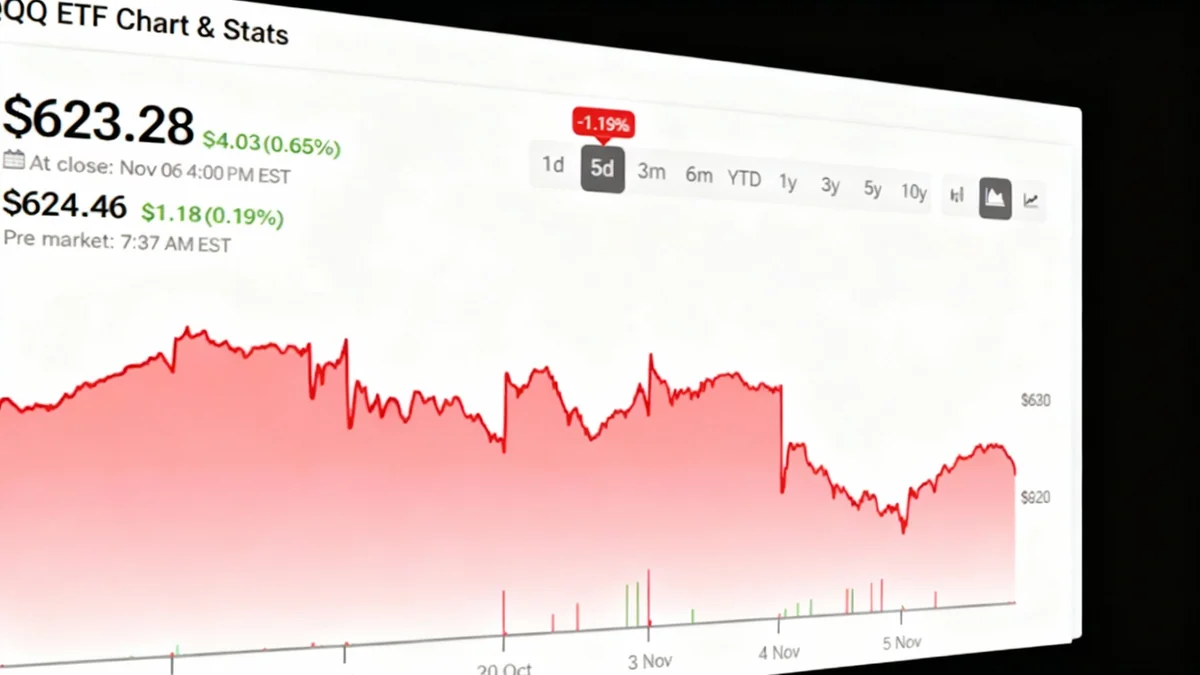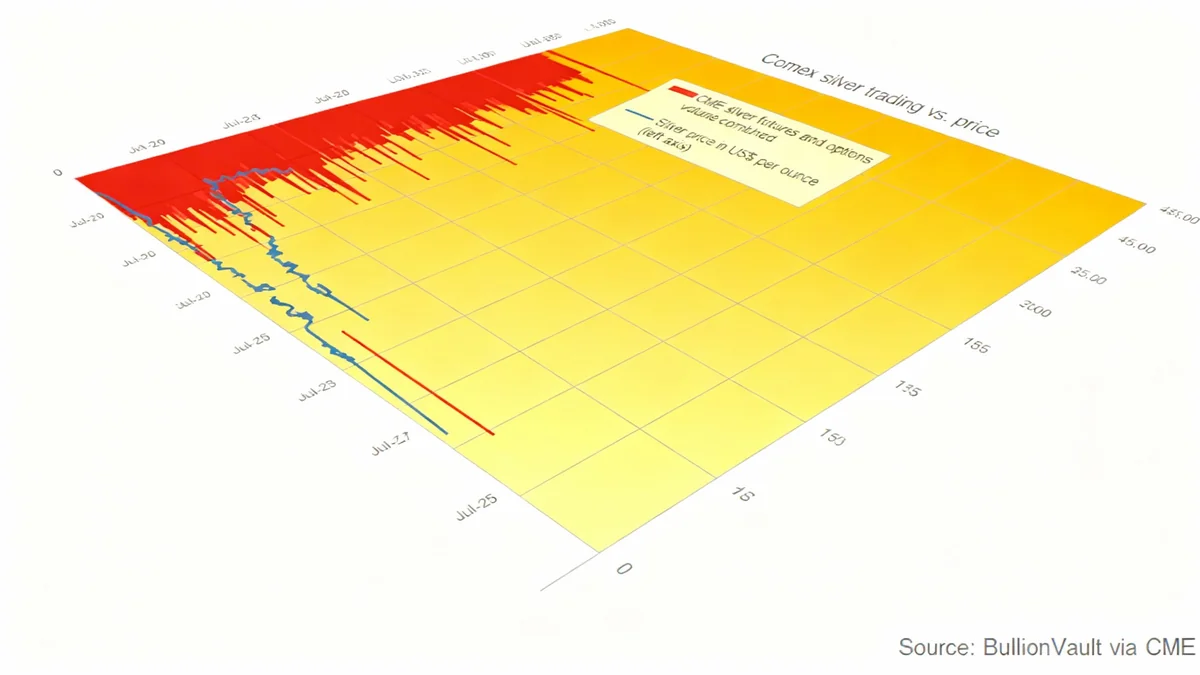The enthusiasm surrounding artificial intelligence (AI) and technology stocks is facing increased scrutiny from investors. While major tech-focused ETFs have seen significant gains this year, recent market movements indicate a shift towards caution, particularly concerning the high valuations of AI-driven companies. This comes as broader economic and legal uncertainties also weigh on market sentiment.
Key Takeaways
- QQQ ETF is up 21.6% year-to-date, but recently declined by 1.19% over five days.
- SMH ETF has gained 46% year-to-date, yet is experiencing downward pressure.
- Investor concerns center on lofty valuations of AI stocks and broader market uncertainties.
- Both ETFs are rated as "Moderate Buy" by analysts, with varying upside potentials for individual holdings.
Nasdaq 100 Tracker Shows Mixed Signals
The Invesco QQQ ETF, which mirrors the performance of the Nasdaq 100 Index, has delivered a strong performance this year. It is up approximately 21.6% year-to-date, reflecting a robust period for the technology sector. However, the past five trading days have shown a slight downturn, with the QQQ ETF declining by 1.19%.
A notable recovery in AI and tech stocks helped the QQQ ETF rise by 0.65% on Wednesday. Despite this, pre-market trading on Thursday saw only a modest 0.19% increase. This suggests investors are carefully watching the market, especially given the high valuations seen in many AI-related companies.
QQQ Snapshot
- Year-to-date gain: 21.6%
- Five-day change: -1.19%
- Analyst consensus: Moderate Buy
- Implied upside potential: 13.5% (average price target $707.36)
Top and Bottom Performers within QQQ
An analysis of QQQ's individual holdings reveals a range of potential outcomes. Based on analyst consensus, the ETF itself is considered a "Moderate Buy" with an average price target suggesting a 13.5% upside potential.
Companies within QQQ showing the highest upside potential include Strategy (MSTR), Dexcom (DXCM), Atlassian Corporation (TEAM), The Trade Desk (TTD), and CoStar Group (CSGP). These stocks are seen as having room for significant growth.
Conversely, some holdings face greater downside risk. These include Tesla (TSLA), Applied Materials (AMAT), Micron Technology (MU), Warner Bros. Discovery (WBD), and Intel (INTC). Investors are closely monitoring these companies for potential volatility.
Understanding the Smart Score
The Smart Score, a proprietary metric, indicates an ETF's likelihood of outperforming the broader market. A score of eight, as seen with QQQ, implies a strong probability of market outperformance.
Semiconductor Sector Sees AI Momentum Cool
The VanEck Semiconductor ETF (SMH), which tracks the MVIS US Listed Semiconductor 25 index, has been a standout performer this year, boasting a remarkable 46% gain year-to-date. This strong performance has largely been fueled by significant deals and advancements within the AI sector, where semiconductors play a crucial role.
However, the SMH ETF is currently experiencing downward pressure. Many of its constituent holdings are trending lower in pre-market trading. This indicates a potential cooling of the AI-fueled rally as investors begin to question if AI stocks have become overvalued.
"Investors are concerned that AI stocks have become too expensive and may be overvalued," market observers note, highlighting a shift in sentiment.
SMH Holdings Reflect Broader Caution
Similar to QQQ, the SMH ETF also holds a "Moderate Buy" consensus from analysts. The average price target for SMH stands at $385.78, implying an upside potential of approximately 7%.
Holdings with the highest upside potential within SMH include STMicroelectronics (STM), Synopsys (SNPS), Microchip Technology (MCHP), Nvidia (NVDA), and NXP Semiconductors (NXPI). These companies are still viewed positively despite the broader market concerns.
On the other hand, the holdings with the greatest downside potential are Applied Materials (AMAT), Micron (MU), Intel (INTC), Teradyne (TER), and Lam Research (LRCX). These companies are facing headwinds that could impact their stock performance.
SMH Performance at a Glance
- Year-to-date gain: 46%
- Analyst consensus: Moderate Buy
- Implied upside potential: 7% (average price target $385.78)
- Smart Score: Eight (indicating likely market outperformance)
Broader Market Factors at Play
Beyond specific sector valuations, broader market uncertainties are also influencing investor behavior. Traders are closely watching the Supreme Court's arguments regarding presidential authority on tariffs. Such legal and trade issues can introduce significant volatility and make investors more cautious about committing capital.
The combination of high valuations in the AI sector and unresolved geopolitical and legal matters creates a complex environment for investors. While the long-term prospects for AI and technology remain strong, the immediate future may see continued periods of re-evaluation and caution.
Looking Ahead
Both the QQQ and SMH ETFs have demonstrated robust performance throughout the year, driven by the rapid advancements in AI. However, the recent market shifts suggest a period of adjustment. Investors are now balancing the exciting growth potential of AI with concerns over stock valuations and external economic factors.
The Smart Score of eight for both ETFs indicates that they are still expected to outperform the broader market. This suggests that while caution is present, the underlying fundamentals of these technology-focused investments remain strong, albeit with increasing scrutiny on individual stock performance and market conditions.





